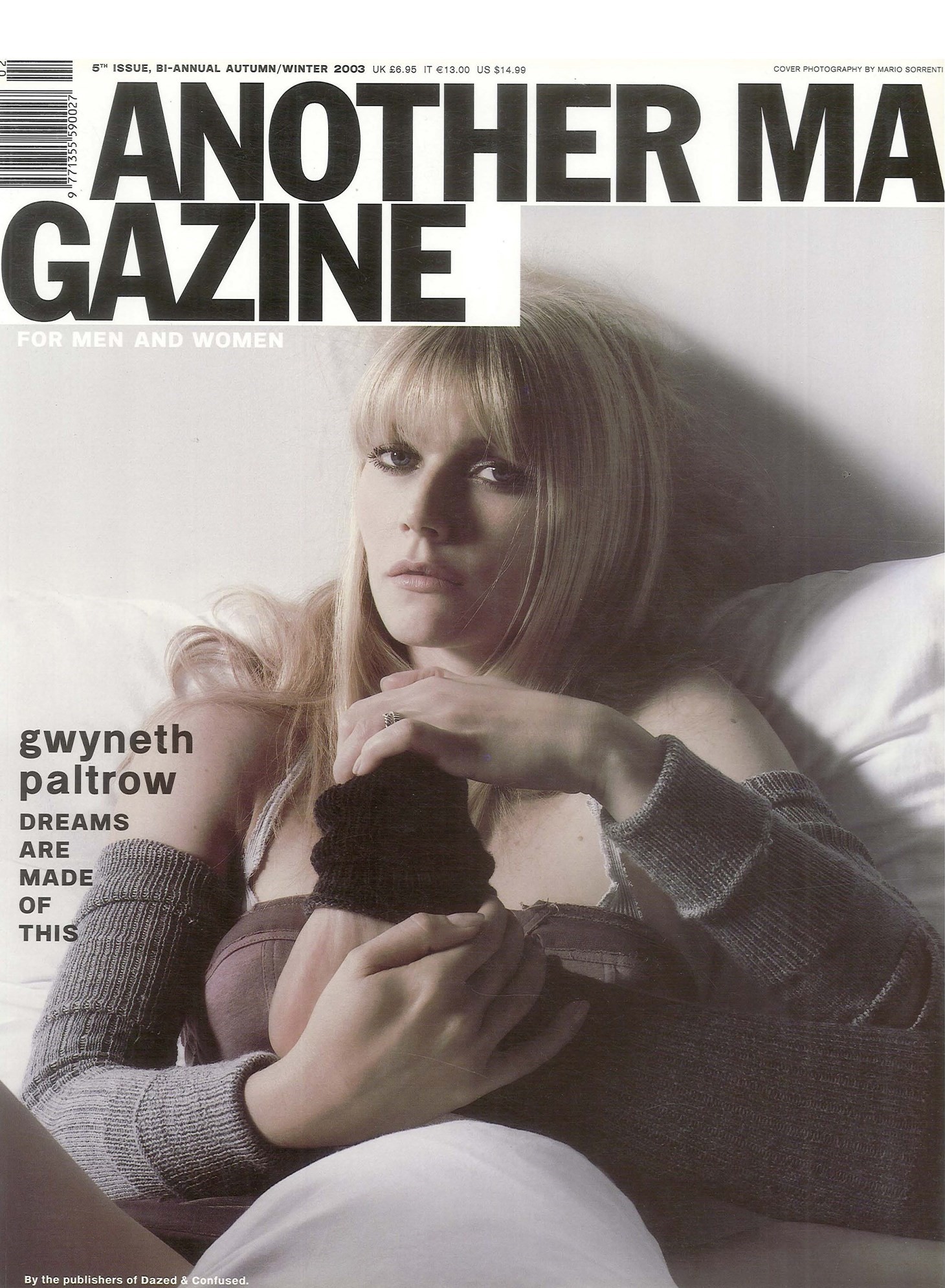If you could ask her one question, what would it be? Since winning an Oscar at 26, she has been a Hollywood icon. In celebration of her career so far, and in anticipation of her latest film, Sylvia, AnOther Magazine brings Gwyneth Paltrow together with an all-star line up featuring her friends, fellow actors, producers, directors and even her family. How much closer can you get?
Wes Anderson: How much of you is Welsh, if any? And, what else goes into the mixture of your blood lines?
Gwyneth Paltrow: Zero of me is Welsh. My mother simply liked the name. She went to school with a girl called Gwyneth when she was very little. lt stuck with her. I am glad it did. I like my name. My bloodlines are quite well mixed – I am a real mutt. On my mother’s side I am German and English/Scottish with some Dutch thrown in for good measure. On my father’s side I am Polish Jewish. Makes for an interesting inner dialogue.
Christina Applegate: What is the one thing that gets you up in the morning, keeps you going and working, giving everything all your grace even when you just don’t feel like it anymore?
GP: I guess lately it’s been sheer discipline. Because of the year I’ve had I’ve taken work very seriously. I used to feel so inspired all the time and that’s what kept me going. But since my dad died, I feel like I’ve been forcing myself a little. It’s weird that Christina used the word ‘grace’ because I feel like that’s what I’ve lost – ease and grace.
AnOther Magazine: Things happened for you quite easily after Shakespeare in Love. Did you have that feeling of going with the flow, just enjoying it?
GP: Yes, exactly. There was an insouciance about the way I approached my work, my life. I reached the top when I was 26. I won the Oscar and in a way I felt really liberated by that, because I thought, ‘Oh well, I can do whatever I want now’. But with that came a lack of focus, a lack of seriousness that I’ve definitely got now, maybe for the first time in my life.
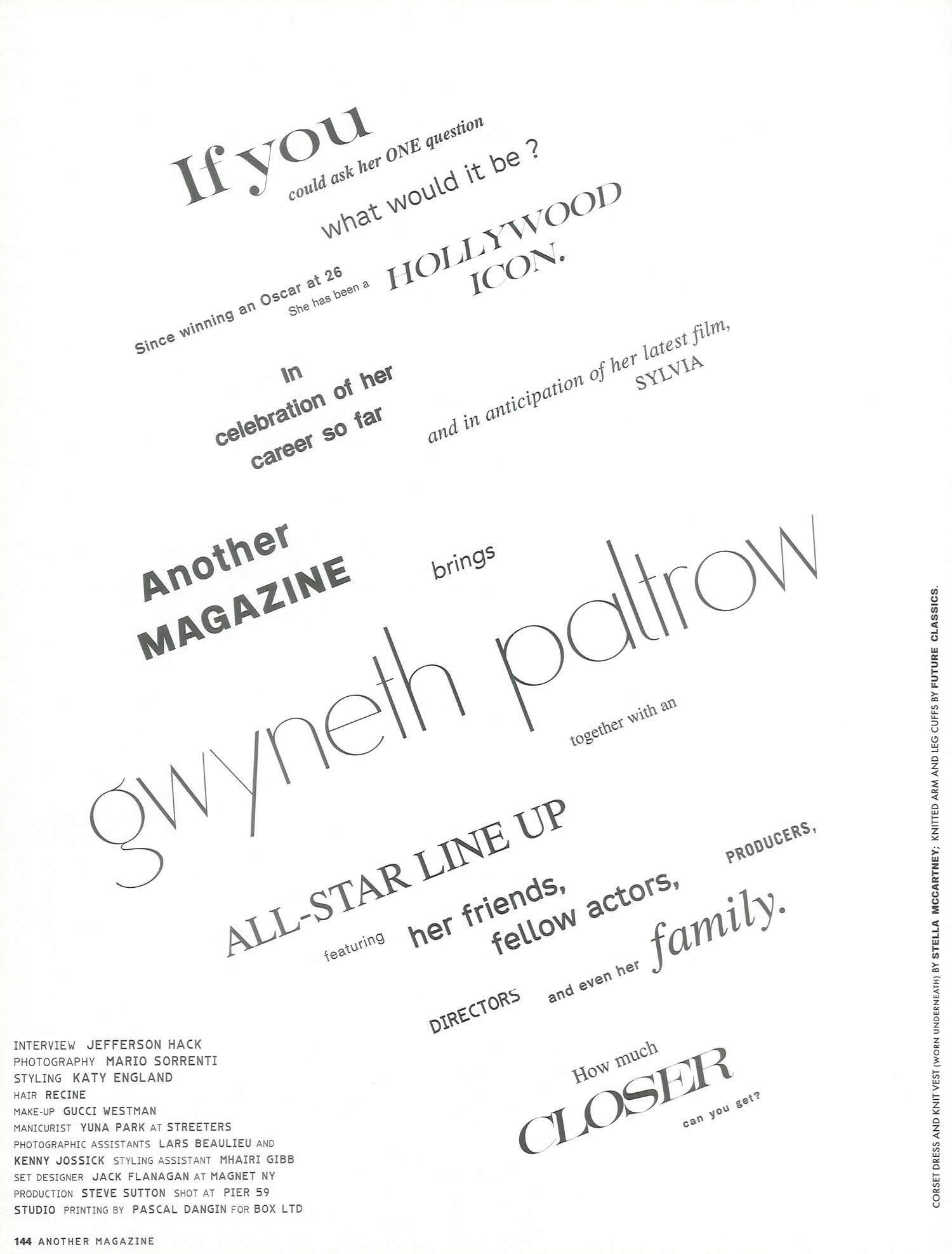
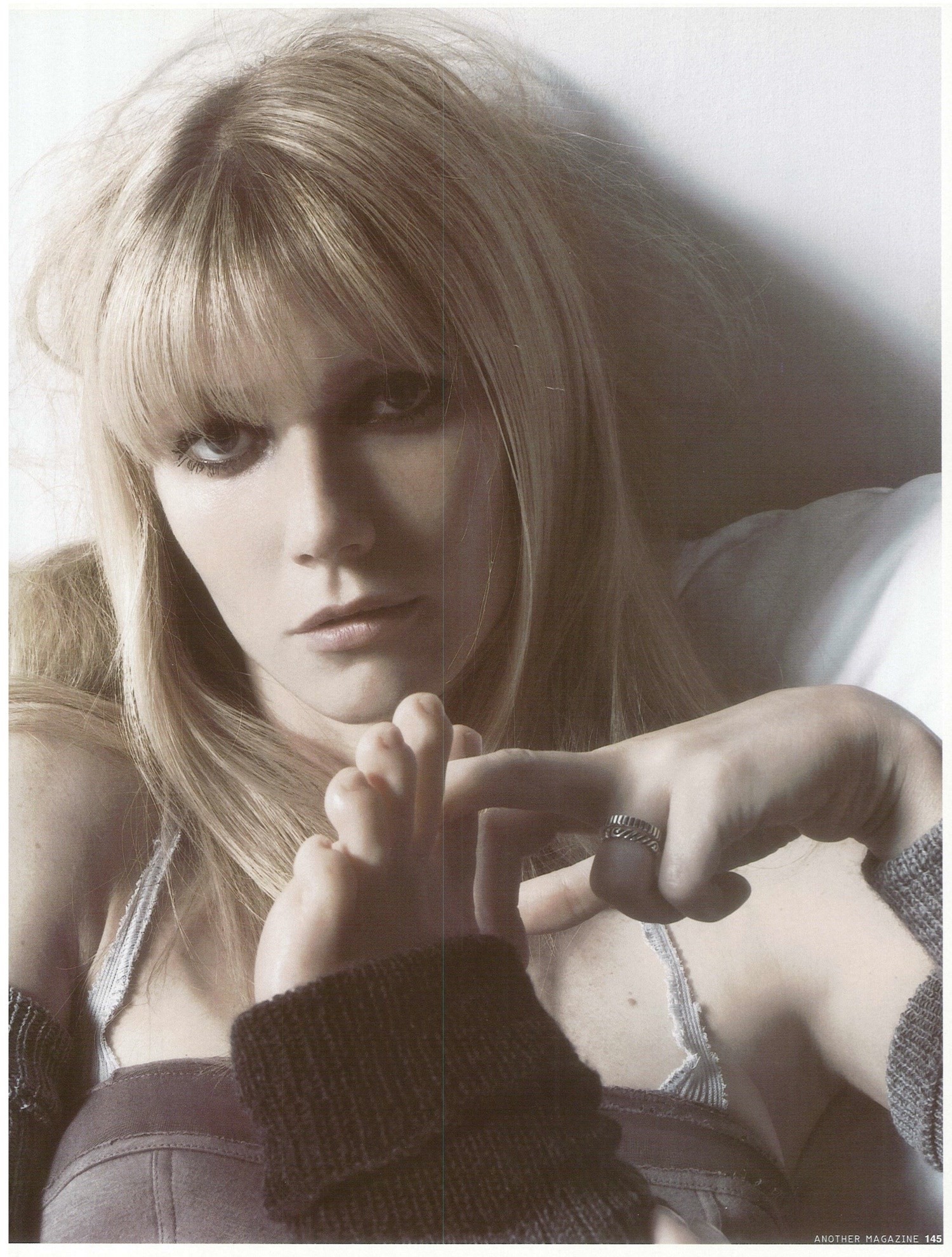
Tom Ford: I have always admired the fact that you are incredibly real as a person. I have watched other celebrity friends wall themselves in and become detached from the real world. Is this a constant struggle for you?
GP: I wouldn’t say it’s a struggle as much as just having to be conscious of it. I find that when you’re famous and you’re young, people are constantly removing obstacles for you. People you don’t even see hear that you’re coming to the airport and get the tickets ready, and all of a sudden you’re not going through life like everyone else does. I think that what can happen, quite gradually, is that you come to expect things. Not in a horrible petulant way, it’s just a natural thing that happens. I constantly have to remind myself, ‘Wait a minute this is not normal, you are being treated specially’. It makes me feel sick, but I get a kind of guilty pleasure from it as well. I have celebrity friends who do wall themselves in. I’m lucky because I have people in my life who are always saying to me, ‘Wait a minute, hang on, this isn’t normal, you’re not seeing things how they really are.’
Neil Labute: Having had such success in your career so far, do you find it harder or easier to make decisions about film roles? What criteria do you use when deciding? Do you weigh your audience into it at all, or do you believe that people will follow you wherever you go?
GP: That’s an interesting question. Before, I went on instinct and would take a role just because it was something I hadn’t tried. I’d just take it and wind up in something mediocre, but not really care. I do feel like I’m at a turning point in my life now and my criteria are getting narrower, definitely. But, I will never factor my audience’s opinion into it, because I can’t. If I did, I would feel like a complete sell out.
Sadie Frost: The character you play in World of Tomorrow, Polly Perkins, reminds me of Veronica Lake. If the movie had been made in the 40s, which classic actress do you think would have been best suited to the role?
GP: lt would have to be someone with a sharp tongue, like Katharine Hepburn. The character is very feisty and articulate.
“I have celebrity friends who do wall themselves in. I’m lucky because I have people in my life who are always saying to me, ‘Wait a minute, hang on, this isn’t normal, you’re not seeing things how they really are’” – Gwyneth Paltrow
AnOther Magazine: Does she wear the trousers in her relationship with the Jude Law character?
GP: Metaphorically, yes she does, but she's in a little tweed Stella McCartney skirt!
AnOther Magazine: Tell me a bit about Polly Perkins.
GP: Well it’s Polly Perkins and Sky Captain, who Jude Law plays. He’s this RAF pilot, Polly’s a reporter and they’re on the trail of this mystery together. They’ve had a relationship in the past and there’s a lot of sexual tension, mistrust and banter, so there’s a great dynamic between the two of them. The whole background is computer generated, all blue-screen.
AnOther Magazine: How did you find that?
GP: I’d shot on blue-screen before, but never anything substantial. lt was tough and could get monotonous but Jude used to make me laugh. We were supposed to be in a cockpit of an aircraft and he would say, ‘I feel like we’re six years old and you’re over at my house’. lt was so fake! We’d laugh about it.
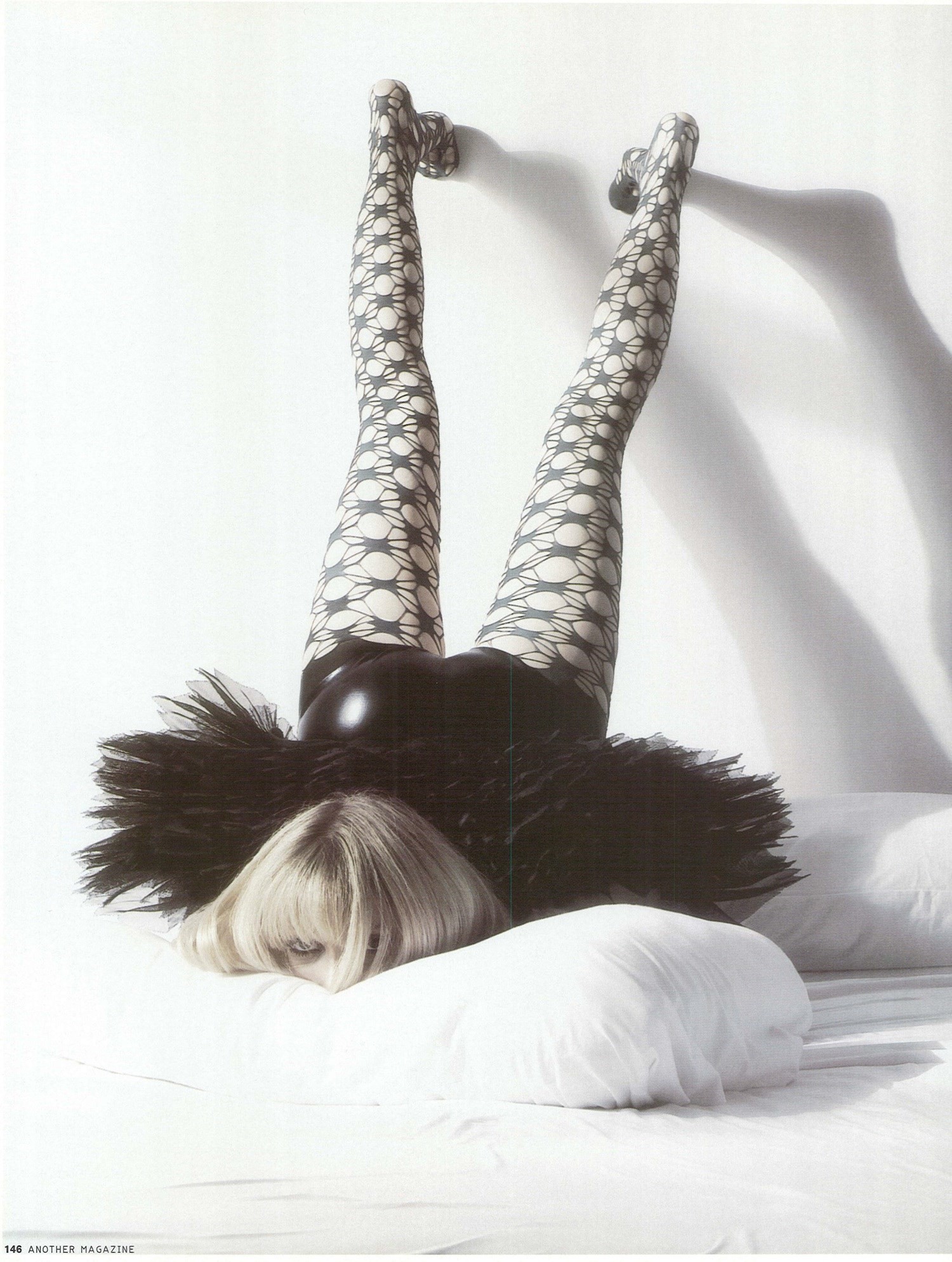
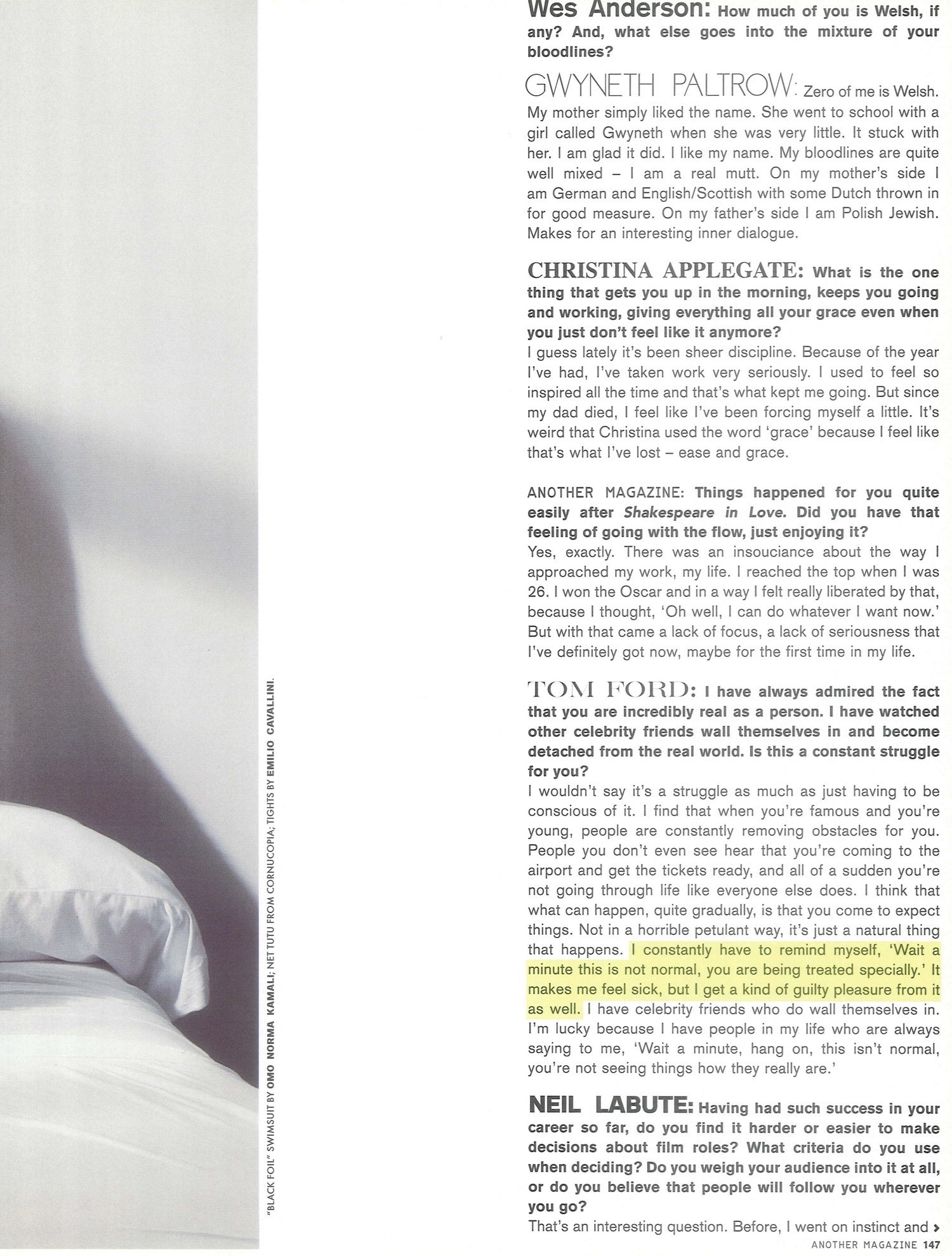
Wes Anderson: Who’s your favourite hero or heroine from books and movies?
GP: My favourite heroine in fiction is Franny Glass or Jane Eyre. I don’t have a favourite heroine in the movies because I don’t really like them.
Neil Labute: Now that you’ve made your London theatrical debut, do you have plans to return to the stage? And after so many film roles, how did it feel facing a live audience again?
GP: I had such an amazing time, it really awakened something and got me re-connected with why I started doing this in the first place. I would love to do a play once a year if I could. lt was scary, but you know, I always realise these things about myself after the fact. Looking back now I think: ‘My God, wasn’t I terrified to go in front of a live audience after all these films, especially in London?’ I have this built-in bravery though, so it petrifies me now, but at the time I thought, ‘Yeah, let’s just go forward’.
AnOther Magazine: What would you call that? Blind optimism?
GP: I think so. My parents instilled great self-confidence in me. My dad always said the whole time I was growing up, ‘You are the greatest, you can do anything’. lt was very bolstering. I think that gets in there when you’re a child, it really does. Of course I have the insecurities of any actress, of any woman, but deep down I have this understanding of what I’m capable of. I was fearless when I did Emma at 22 years old. I came over to England and I’d never done an English accent. And it wasn’t until the movie came out and the press were asking ‘weren’t you at all intimidated going over there?’ that I realised what I had done.
“My favourite heroine in fiction is Franny Glass or Jane Eyre. I don’t have a favourite heroine in the movies because I don’t really like them” – Gwyneth Paltrow
Neil Labute: What other job in your industry do you find yourself most attracted to? If you could do something other than act, would you write, direct, do make-up, produce... ?
GP: I think I would be a producer because I think I’m quite good at arranging people and seeing holes in scripts or seeing great things in scripts. I don’t think I could be a writer.
AnOther Magazine: What would your motivation be for producing?
GP: Getting things made that are worthwhile, because I’m really having a crisis about the kinds of films that are getting made and the kinds of films that are successful. I’ve realised that I just will not be in Whatever-it-Is Part 2 or Part 3, I won’t be in these lowest-common-denominator romantic comedies. lt takes too much out of my life. I’d rather make less money and take more risks, try to at least put something into the world that’s worthwhile, that has something to say.
AnOther Magazine: lt sounds like you’re on a bit of a mission ...
GP: lt’s true! I am on a mission! I would also like to be the crowd service person. They don’t have them so much in England, but in America, on a movie set, there’s a snack table where people make cappuccinos and smoothies. I’d make really healthy smoothies.
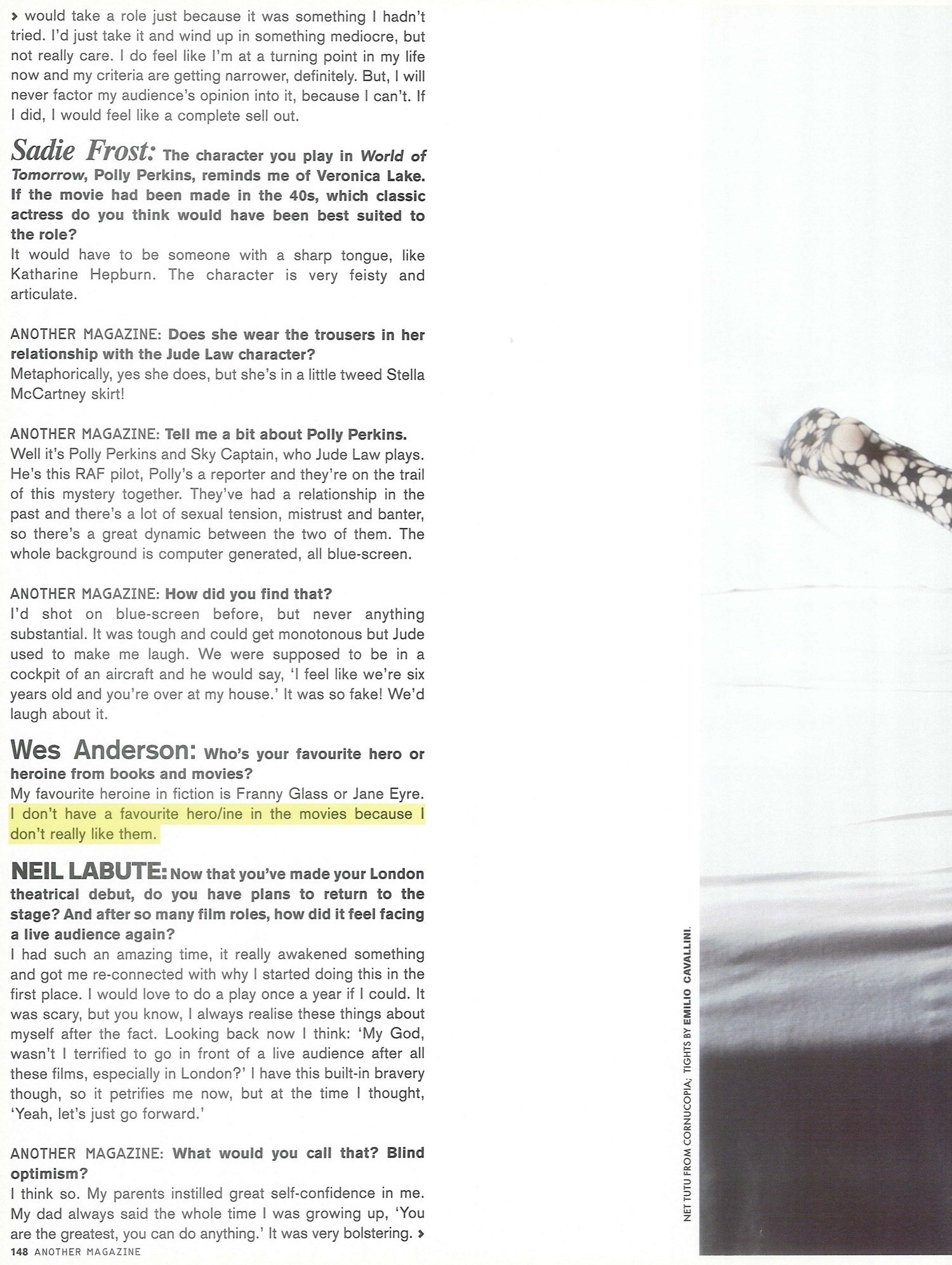
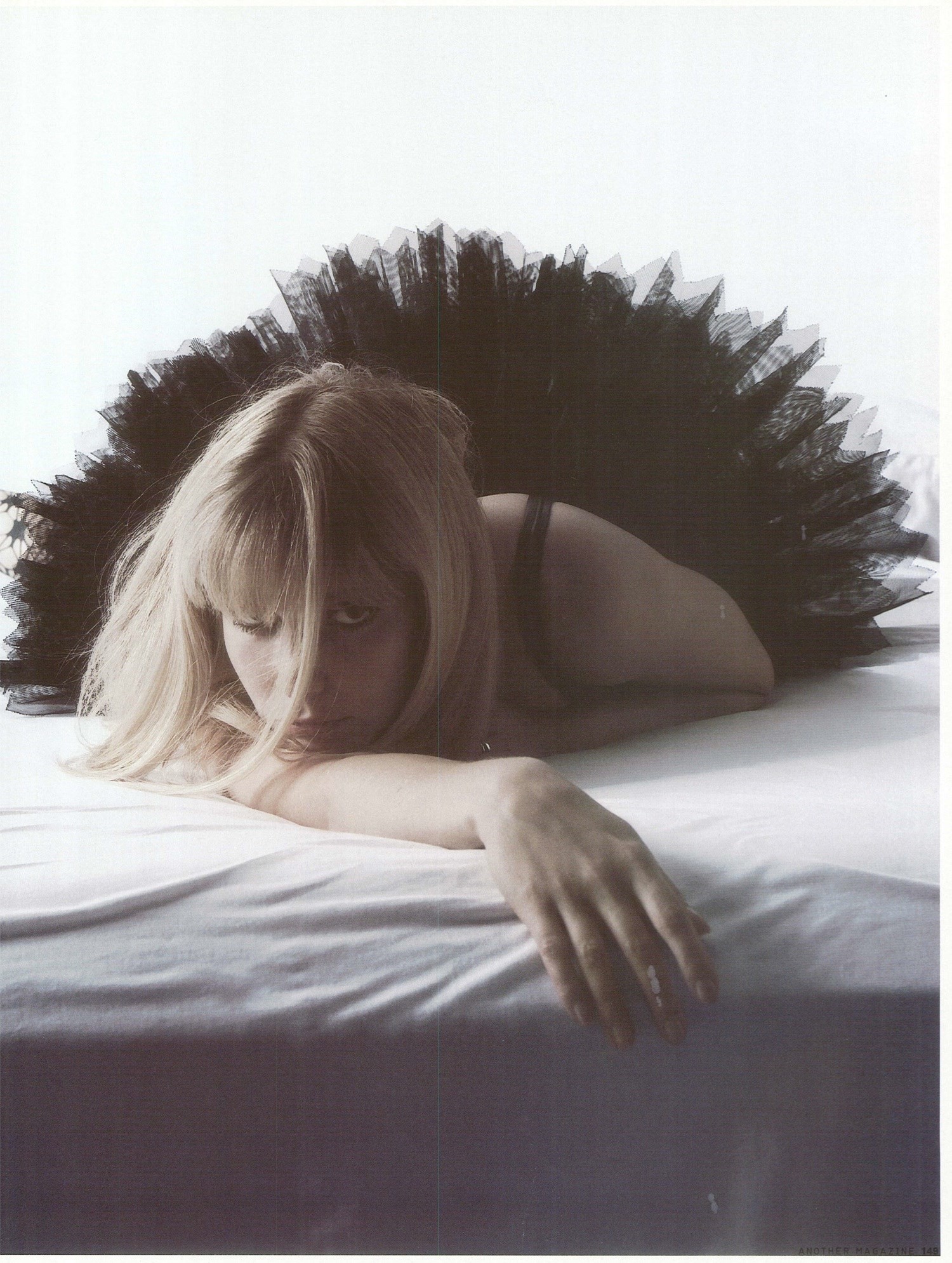
AnOther Magazine: What attracts you to that?
GP: I don’t know, I’m a bit of a homemaker. I like to cook.
Amira Casar: Hola Sexy! I have this question we couldn’t talk about on the set of Sylvia. My fear playing Assia was that fiction wouldn’t do justice to a life already so mysterious and washed out of history. Her short, misunderstood, troubled life, and her suicide with Hughes’ child saddened me. Did you feel this guilt or any guilt at all portraying Sylvia Plath?
GP: That’s a good question. I was having this very interesting conversation with Nora Ephron yesterday. She’s a writer and director; she wrote When Harry Met Sally and directed You’ve Got Mail. She’s a brilliant New York intellectual. She was asking me about Sylvia and I was saying how difficult it is to know what goes on in biographies. In fiction everything is possible. For example if you read Madame Bovary, you understand the relationships, you know exactly why things went down the way they did. In biography, you can never really know. My worry came from how I would ever be able to portray all the facets of this woman – she’s so complicated. My guilt was that she has children who are still alive and was I hurting them by participating in the film? lt was a struggle because obviously I’m a person who really believes in privacy and in family.
Amira Casar: There were certain similarities between Assia and Sylvia. Naively, I like to think that without Hughes, these two fascinating women could have been a comfort to one another. What do you think? Did Hughes damage them?
GP: The very basic principle with which I approached the whole thing was that it takes two people to create a dynamic and I never in my mind vilified Ted Hughes or blamed him for her death. There was obviously something innately attractive to Ted Hughes about complicated women. I find the fact that Assia killed herself in the exact same way that Sylvia did was very manipulative and stagey, like ‘I’m going to show the world what you’ve done’. I don’t think that Sylvia had that kind of venom.
“The whole idea of a film star and films is that they’re escapism. Films are two hours of your life when you can go in and feel something that you wouldn’t feel if you had stayed home” – Gwyneth Paltrow
Christine Jeffs: Is there any other character you’d like to play based on a real person?
GP: I would like to play Catherine the Great or Marie Antoinette, some incredibly power mad, complicated woman. I think it is my favourite thing to uncover the reasons behind why someone is reviled, unloved. I especially find it fascinating when historical women get assigned titles like ‘monster’.
Alexander McQueen: Do you think the term ‘film star’ is relevant to the 21st century?
GP: I think that we’re moving into an age where everyone is a celebrity, everyone’s a star. I think film stars are relevant because they’re famous for actually putting something into the world, something that takes thought and creativity, as opposed to letting a camera watch them 24 hours a day.
AnOther Magazine: In the past, we didn’t know as much about the lives of stars. Now, with celebrity culture the way it is, with magazines the way they are, the ‘ordinariness’ of actors is exposed more and the mystery and glamour have gone.
GP: The romance and mystery of old Hollywood have gone. We’re redefining what it means to be a film star in this day and age. Photographers take the worst pictures of stars walking down the street in sweatpants and people go through their garbage. The public are the ones shaping how they want to see things and it’s their appetite for seeing Elizabeth Hurley with shopping bags in a market that’s changing the way that the media is handling everything.
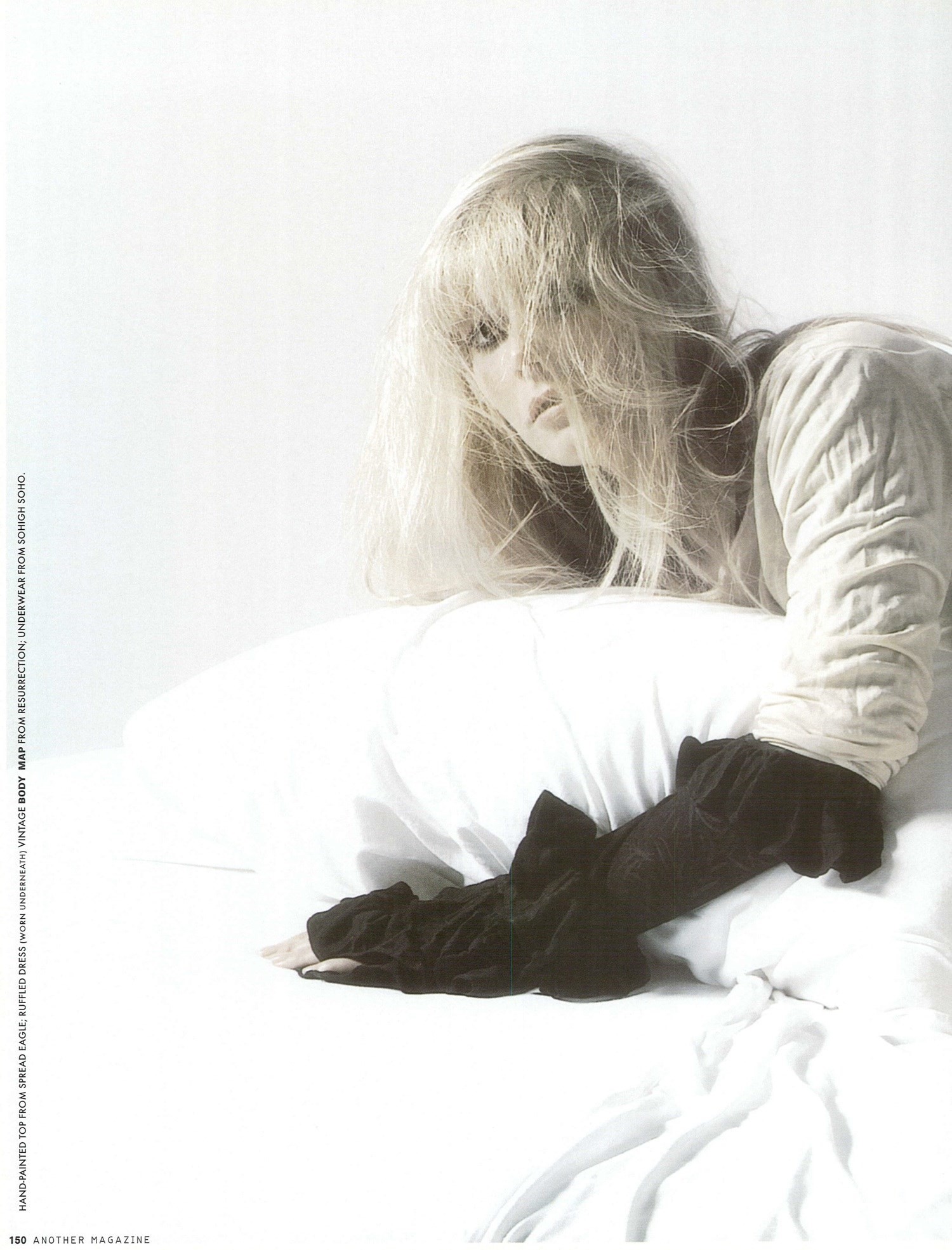
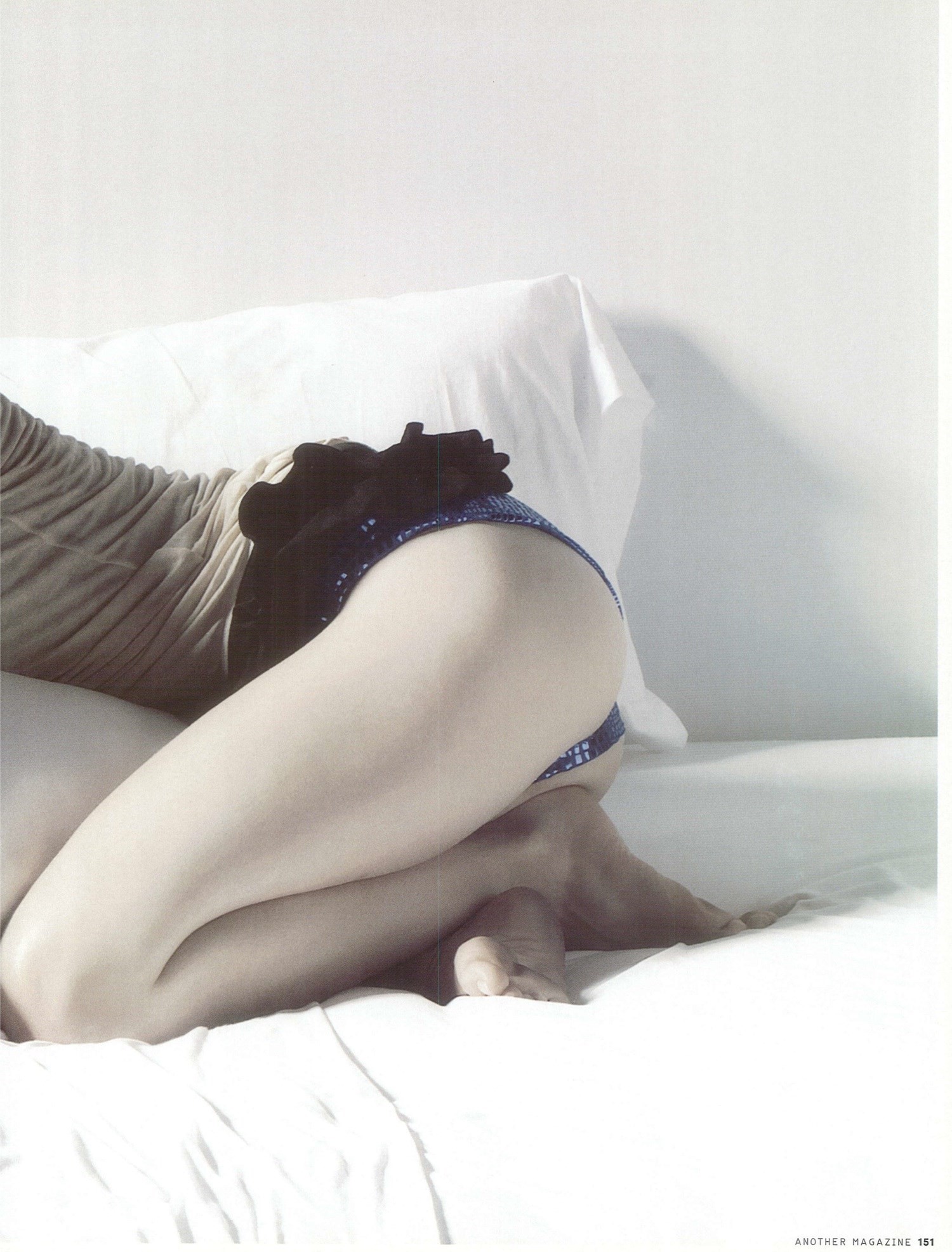
AnOther Magazine: Do you care about it?
GP: Do I? I think it’s a shame that the sheen has rubbed off. The whole idea of a film star and films is that they’re escapism. Films are two hours of your life when you can go in and feel something that you wouldn’t feel if you had stayed home. It’s like entering another world and it is a shame when the bubble bursts.
Blythe Danner: Does your natural gift for music, your ability to sing just about anything and play the piano by ear, inform your talents as an actress? The accents, your ability to inhabit such a broad stroke of characters.
GP: Awww. Well I use music all the time when I work. I always have my iPod and I listen to music to get myself to the right emotional level.
AnOther Magazine: Did you have specific music you listened to for Sylvia?
GP: Absolutely. During Sylvia, I listened to the last Sigur Ros record. I listened to Jeff Buckley, the Corpus Christi song. There was a Sarah Mclachlan remix which my friend Kevin Aucoin gave me right before he died and there’s a song on that I listen to a lot. But to answer the question, I think if you have a musical ear you can hear things and harmonise and imitate stuff – it really helps with accents – it’s the same part of the brain. But I get all that from my mom, she’s incredibly musical. She always had instruments around the house.
“I realise that the size of your love for someone is proportional to the size of your pain when they’re out of your life” – Gwyneth Paltrow
Blythe Danner: Do you love me?
GP: Awwww. Is that what she asked? I love her with all my heart. What edgy, cool questions from my mom.
Stella McCartney: Do you think love and loss are similar emotions?
GP: I do. I don’t know if it’s what’s happened to me with my dad, but sometimes I feel now that I love someone so much that the next emotional layer is fear of losing that person. I realise that the size of your love for someone is proportional to the size of your pain when they’re out of your life.
Sadie Frost: One of the things admire about you is your strength. What do you attribute it to? Where do you get it from?
GP: I don’t know quite where it comes from, I suppose it’s from my family again. No matter what happens I have them, so I’ve never felt alone in the world. I think the reason that Sadie perceives me as strong is because a lot has happened in my life. I have been emotionally decimated a few times. I lost a cousin at 17, a good friend in an accident a year later, my best friend’s mother at 21, my grandfather when I was 26 which was a real blow because we were very close – and then my father who was the centre of my world. Within that time frame I had a broken engagement and a drawn out and tortured relationship with a complete knucklehead. I have made and lost friends and seen people change. I have gotten the wrong idea about life and then righted myself. I have had a big life in the last decade. Sometimes it has made me feel heavy and weary and like the shine has worn off me, especially since my dad died. But life has a funny way of equalising things, and in another respect I am happier than I have ever been.
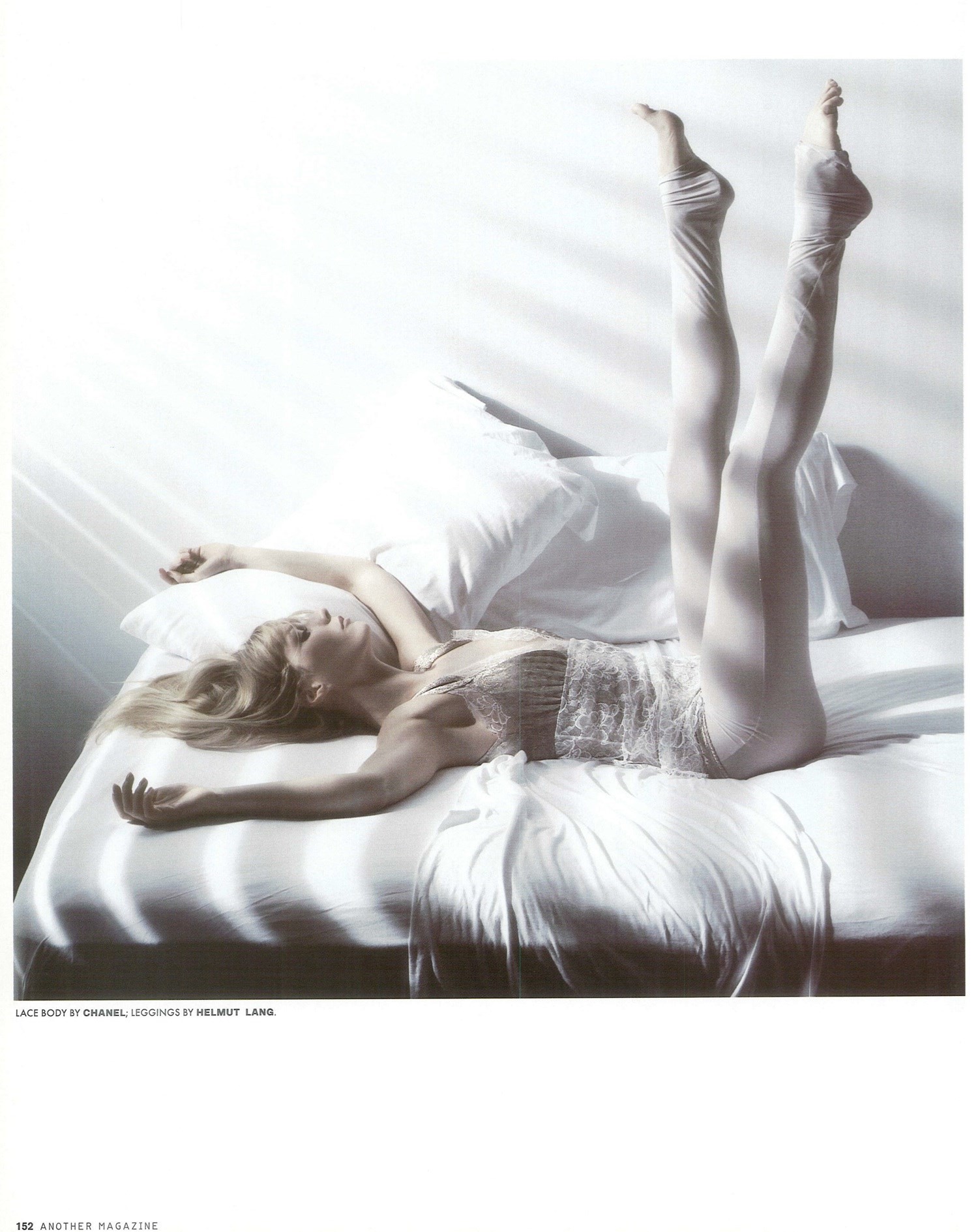
Valentino: Gwyneth, would you leave forever your career to follow your boyfriend or husband to a little island in the middle of nowhere?
GP: (Laughing) I think I would if it was something that we were doing together. If I didn’t feel like I was compromising everything I was and everything I have in order to do his thing. If it was ‘let’s do this together’ I would.
Steven Spielberg: (This is what we received from Steven Spielberg’s office) This interview is certainly an interesting and unique approach. Mr Spielberg is leaving for the summer this week and is tying up loose ends, so he regrets that he won’t be able to participate. Good luck!
AnOther Magazine: Let’s turn that around then, what question would you like to put to Steven Spielberg?
GP: The thing that amazes me most about him is that he has this infinite capacity to imagine things. I would want an insight into how that works. He was saying the other day that his mother was a pianist and he used to lie under the piano and watch her feet and would never let her open the top of the piano because he was afraid of what was inside. He’s always playing video games, he’s so in touch with that 13 -year-old boy, hyper-imaginative mind. I’d want to know how he maintains that.
Anthony Minghella: Gwyneth Paltrow is intelligent, intuitive and unerringly true as an actor; capable of being, by turns, fragile, funny and forceful. She can be as good, as enduring, as startling, as she wants to be. lt’s in her hands. And that’s a curse as well as a blessing.
AnOther Magazine: How would you respond to this statement?
GP: I see it definitely as a blessing. I feel frustrated by the fact that sometimes I hold back – or I have in the past. If I feel like the material can’t support what I’m doing, I really withhold and then I think I’m just wasting my time.
AnOther Magazine: Do you ever think you can’t support the material? Do you ever feel that if you want to do it as well as you would like to, you have to give parts of yourself that you might not want to?
GP: I’ve definitely felt that in the past, not knowing how I’m going to get there. But I think it just takes work and a relentless determination not to give up. I think you always know that it’s in you. You have to in order to be an actor, you have to think you’re capable of it all. I don’t ever think of it as a curse that I have to go somewhere I don’t want to go to. That’s my job: to force myself into uncomfortable areas in my own heart and soul.
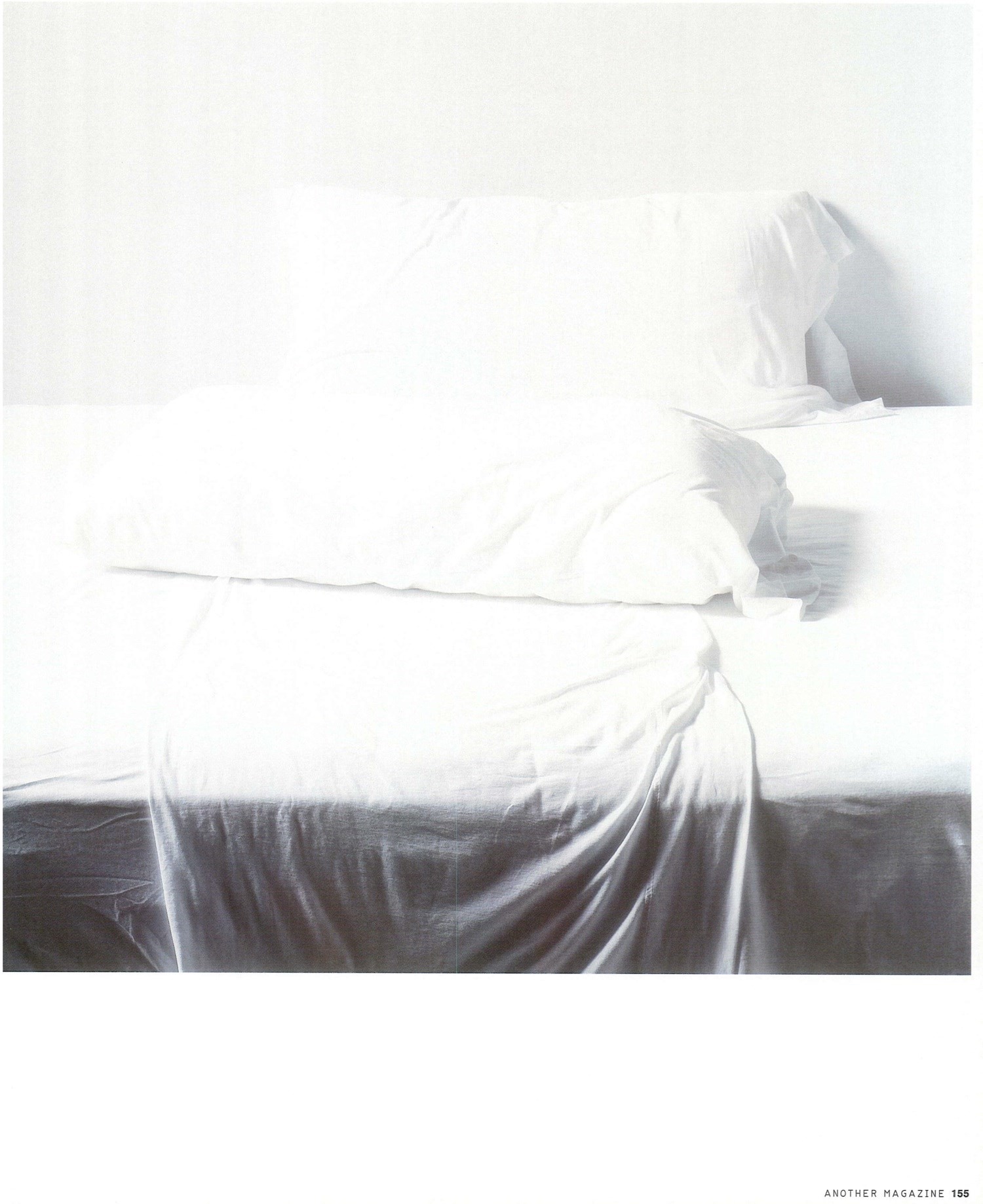
Cast List:
Wes Anderson, Director: The Royal Tenenbaums
Christina Applegate, Actor: View From The Top
Amira Casar, Actor: Sylvia
Blythe Danner, Mother; Actor: Sylvia (She plays Sylvia Plath’s mother)
Tom Ford, Fashion Designer
Sadie Frost, Producer: World Of Tomorrow; Actor: The Anniversary Party
Christine Jeffs, Director: Sylvia
Neil Labute, Director: Possession
Stella McCartney, Fashion Designer
Alexander McQueen, Fashion Designer
Anthony Minghella, Director: The Talented Mr Ripley
Steven Spielberg, Longstanding family friend; Director: Hook
Valentino, Fashion Designer
This story originally appeared in AnOther Magazine Autumn/Winter 2003.
Hair: Recine, Make-up: Gucci Westman, Manicurist: Yuna Park at Streeters, Photographic Assistants: Lars Beaulieu and Kenny Jossick, Styling Assistant: Mhairi Gibb, Set Designer: Jack Flanagan at Magnet NY, Production: Steve Sutton, Shot at Pier 59 Studio, Printing by Pascal Dangin for Box Ltd
